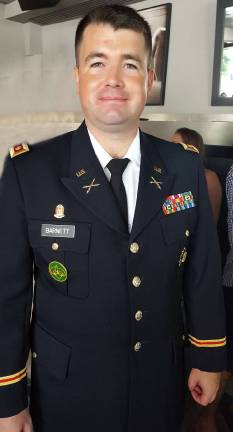Warwick Valley High School graduate promoted to U.S. Army rank of major

WARWICK — U.S. Army officer Robert Barnett, the son of Robert and Margaret Barnett of Warwick, was recently promoted to the rank of major.
Barnett had been assigned to the Pentagon to serve as the Strategic Broadening Chief in the Strategic Leadership Division of the G-3/5/7 of the U.S. Army Staff.
After receiving a Meritorious Service Medal, he was reassigned to John Hopkins University School of Advanced International Studies to study for his master's degree in International Public Policy with a concentration in Middle East Studies.
Several years ago Barnett learned to read, write and speak Modern Standard Arabic at the Defense Language Institute/Foreign Language Center in Monterey, California. He was then assigned as an Army Foreign Area Officer at the American Embassy in the Kingdom of Bahrain.
Tours in Korea, Iraq, AfghanistanAfter completing his studies and receiving his advanced degree this December, he will return to the Middle East where he will serve as staff officer with the U.S. Embassy in Kuwait.
Barnett is an Eagle Scout with Troop 38, a graduate of Warwick Valley High School in 2002 and Virginia Polytechnic Institute and State University in 2006.
He served tours in Korea and Iraq, where he was assigned as a Fire Direction Officer in a combat zone north of Baghdad. He then completed the Field Artillery Captain's Career Course at Fort Sill, Oklahoma, and commanded an Army Battery unit in Afghanistan.
Cultural immersionWhile serving in Bahrain, Barnett had an opportunity to travel throughout the area for cultural immersion.
"As part of that program," he said, "I traveled to 11 countries in the Middle East and North Africa. I met with U.S. Military, Department of States, and other government agencies to include USAID and Departments of Treasury in each embassy to develop an understanding of U.S. Policy concerns in each country and of national issues, host countries' governments and armed forces. I also conducted visits to cultural sites and interacted with the local population in both English and Arabic, when possible."
- Roger Gavan